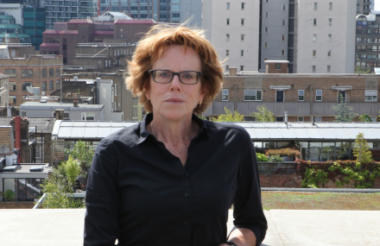Social CEOs is all about celebrating what’s great about social media - the connections we can make, and the knowledge we can absorb by being part of the conversation. But we know there can be a dark side to it, which we can’t ignore.
We wanted to share one woman’s experience of being on the receiving end of Twitter trolling. Here’s Shelter’s CEO Polly Neate’s account as told to Matt Collins - and her tips on how to deal with it.
What made you start on social media and why?
I love Twitter. I have fun on there and find it so useful - especially because of the contacts that I’ve made. I now consider it an essential part of the job. I have made contacts that have undoubtedly benefited both Women's Aid, when I started, and now Shelter.
I started out on Twitter when I joined Women’s Aid as CEO. I felt it would benefit an organisation that works on an issue that is taboo and - especially at that time - not discussed enough, for me to be open and to provide another, more informal channel. I thought me being on Twitter would help the organisation, basically. I didn't expect to enjoy it as much as I did, and still do.
I've now started Instagram as well because I think that will eventually be as much part of the job as Twitter - hopefully it's not yet as I'm not very good and don't have many followers!
What are your experiences of trolling?
There was abuse from the start - a mixture of unpleasant criticism and outright trolling. A common theme I heard is that feminists like me must hate men, or even more pathetically, have “Daddy issues”.
It escalated at Women's Aid when we started campaigning about how the family courts treat women, which we expected would strike a nerve. The organisation did a comprehensive risk assessment before embarking on the campaign - but the campaign was the right thing to do, and our responsibility actually.
It was very personal abuse - doctored photos of me, personal insults. “Polly Neate is worse than Al-Quaeda.” That's funny. “She is a liar” is more of a problem. I didn’t really find their words that upsetting personally, but as a person in a position of public trust, being accused of fabricating facts isn’t good.
Did trolling reduce at all when you moved to Shelter?
I thought it would stop when I moved to Shelter, but the abuse followed me. Initially it even escalated for a bit, I think because it was seen to be me getting out of my box, a feminist leading a more high profile organisation outside of the women's sector.
It was very important to me to continue tweeting about the things that mattered to me at Women's Aid. I think that getting some criticism on social media is a lesser evil than being inauthentic and nothing more than a hired gun who doesn't truly commit to a cause on a personal level - when actually being on social media is partly about demonstrating that you do.
I get some trolling about how feminism causes homelessness (I’m not sure how they work that out!), how we victimise men, and drive them to homelessness. There was a lot of stuff at one time about how I had banished all pictures of men from the Shelter website, which is so funny - can you imagine, my first week as CEO and obviously my priority was to get men off the website immediately! It's so daft. And as a woman and a CEO, there’s accusations by a certain group of landlords that I earn too much. Feminism, campaigning and charity CEOs' pay is a perfect storm, really.
Trolls do sometimes target our corporate partners and I think sometimes my personal profile contributes to that. The higher profile you are, the more likely that is. So if it’s an issue for you, your organisation's risk matrix needs to include how you will manage that. And it is manageable.
Openness is the best option with partners. It's best if you’ve had the conversation already at the launch of a relationship - just to tell them that there’s a small and minor sideshow over here to be aware of. And big corporates get abuse all the time, they are used to it, which makes it even more manageable.
Very occasionally I do react on Twitter. I once did a tweet about a sexual harassment news story. Someone responded to it saying “Believe me Polly, you’ll never have to worry about sexual harassment.” I quote tweeted it saying “What could he possibly mean?”. He didn’t respond, but I did get lots of supportive tweets.
What's the biggest shock or surprise about trolling?
I’m always amazed how trolls can take the most innocuous of my tweets and turn it into something that meets their agenda. Like the time I tweeted about helping my daughter tidy her room. They said that she’d tidy her own room if only she had a father figure. So many assumptions packed into that, where do you even start! We actually fell about laughing at that one.
But things have improved now. If you Google me today, the first results are no longer posts about me being a liar as they once were. I can't pretend that didn't bother me a bit.
What do you think charity leaders should remember about social media and trolling?
I do think it’s important to try to get perspective on trolling. I don’t mean that in a patronising way. Charity CEOs are public figures, which brings huge responsibilities. We have a lot of influence and access to decision makers, and I think it’s our responsibility to be on social media.
It has its risks and upsides and downsides, it’s about cracking on with that. Trolling can feel like someone’s written a horrible message about you and pinned it on every car, tree and lamppost in your neighbourhood. But it’s not like that. Other people don’t take it that seriously. Most people, particularly people who follow you because of what you do, are not thinking "Oh this lone weirdo thinks this, so there must be something in it". The only people who are actually thinking “Polly is worse than Al Qaeda" are the people in that small bubble. They might be a horrible set of people - but they aren’t your core audience.
A lot of it is about keeping hold of the positives of communication, which we have a responsibility to do. Just keep your aims in mind - what you are trying to achieve for your organisation is too important to let the risks scare you off social channels.
What do you think charity leaders can do about trolling?
The emotional impact on people is particularly hard. I wouldn’t advise people to “woman up”, and we are all very individual in terms of what hurts us and what doesn't. I’d usually advise ignoring and muting over blocking.
I personally haven’t blocked anyone - I think it could prompt people to publicise you as somebody who can’t take criticism. But if your mental health and happiness are on the line, then you definitely should block. If you do, make sure someone in your organisation is monitoring what is said about you. The organisation needs to know.
If anything happens that’s a crime, you should always report it to the police, even if you think they can’t do anything. My house has been egged quite a few times, and my tyres have been slashed. I can't prove it's related to the trolling, or the groups who do it, but I've heard my name shouted so I know it's personal. Unfortunately - or perhaps fortunately - I can't think of any other explanation. And it doesn’t happen to other people in my area so it’s important that the police know.
One of my key tactics for dealing with abuse on Twitter is to try to de-escalate it. For example, when there were doctored photos of me, I untagged myself from them, without responding directly. I did have to steel myself a bit to look at them, but I managed it - it wasn't anything obscene, but still it felt very intrusive. But I do sometimes correct factual errors if they are significant. It's best if possible to do this in a separate tweet rather than replying or quote-tweeting, which gives publicity to the troll.
And when the abuse relates directly to the charity you work for, you can use the charity account to correct misconceptions. When I was accused of stopping Shelter helping men, we did tweet from Shelter to correct it. We didn’t want to put men off who Google for help and see these lies first.
If there’s a particularly funny trolling tweet, I will sometimes quote tweet it and say “look at this, it’s hilarious”. It’s probably an unwise thing to do, because I’ve got 15,000 followers and it gives trolls exposure. Sometimes it can make them angrier, but I don’t really care.
Does the trolling ever make you want to tweet less about feminism?
I’m not prepared to give up tweeting about feminism - it’s part of who I am. I believe it’s important to show that it’s ok to be a feminist CEO. Us feminists have got a responsibility to say that’s what we are.
What’s more, the real victims of the housing emergency are the people living on the streets, fleeing domestic abuse, stuck bringing up children in appalling temporary housing... standing up for them on social media is what makes it worthwhile.
I believe in the reputation of charity CEOs as credible voices in the world. The role of civil society leaders in national debate is underpowered, and sector bodies like NCVO and ACEVO could really help with that.
Public sector and business leaders don’t have to be quite as transparent as we do and therefore we must hold ourselves to very high standards, yet their opinions have more cultural weight - despite the roles we play in people’s lives. If charities did have that traction at the centre of British national life, this sort of thing would happen in a different context. If charity leaders had greater importance, all of this would be a tiny ripple in the ocean, whereas now it seems like a bigger ripple in a small pond.
As a big believer in peer support, I’m always really happy to talk to anyone who has experienced trolling for the first time, and I’m sure other CEOs would be as well. So if anyone wants to send me a Twitter DM asking for a quick chat, I’d happily do it. I'm very conscious that at both Women's Aid and Shelter I have had some incredibly good communications professionals behind me. A lot of CEOs in smaller organisations don't have that and I would very willingly help anyone out who needs it.
Polly Neate is the chief executive of Shelter, Matt Collins is the director of Platypus Digital and co-founder of Social CEOs, which today published a report about the experiences for female charity CEOs with Acevo
|
Related articles












